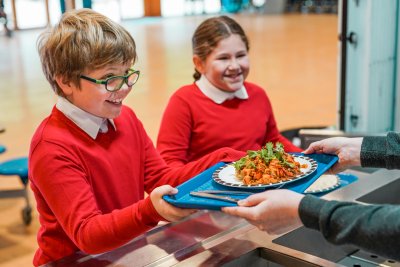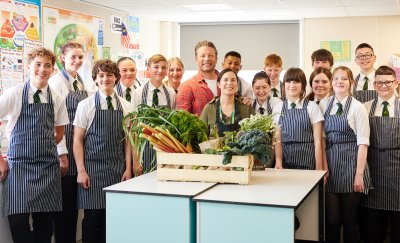As a Department for Education consultation on the school curriculum closes, 22 health charities and medical organisations including the British Medical Association, five Royal Medical Colleges and UK Faculty of Public Health have written to the Government, urging them to ensure that every child continues to learn practical cooking skills as part of their education.
 The Department of Education is currently undertaking a review of the National Curriculum with the stated intention of slimming it down. The letter’s signatories are concerned that in the process we will lose the provision to teach children the basic skills to prepare healthy meals for themselves and their families.
The Department of Education is currently undertaking a review of the National Curriculum with the stated intention of slimming it down. The letter’s signatories are concerned that in the process we will lose the provision to teach children the basic skills to prepare healthy meals for themselves and their families.
Children’s Food Campaign Coordinator Jackie Schneider said:
“If this Government wants a public health strategy based on individual responsibility and personal choices then it’s absolutely vital that we educate our children with the skills to do so. Being able to cook enables people to live healthy lives. It would make no sense to take away school cooking lessons when we are in the midst of a massive obesity crisis.”
The letter builds on the support of a number of top chefs, who have spoken out in support of keeping practical cooking lessons on the curriculum.
ENDS
For further information and interviews, please contact Christine Haigh on 0203 5596 777 or 07870 577934 or christine@sustainweb.org.
Notes to editors
1) The Children's Food Campaign wants to improve children's health and well-being through better food - and food teaching - in schools, and protecting children from junk food marketing. We are supported by over 150 national organisations. The Children's Food Campaign is coordinated by Sustain: the alliance for better food and farming and funded by the British Heart Foundation. For more information, see http://www.childrensfoodcampaign.org.uk/
2) The letter has been signed by representatives from the Association for the Study of Obesity, British Dietetic Association, British Heart Foundation, British Medical Association, British Society of Dental Hygienists and Therapists, Caroline Walker Trust, Centre for Food Policy at City University, Children’s Food Campaign, Consensus Action on Salt and Health (CASH), Diabetes UK, Health Education Trust, National Heart Forum, National Obesity Forum, Royal College of General Practitioners, Royal College of Nursing, Royal College of Obstetricians and Gynacologists, Royal College of Paediatrics and Child Health, Royal College of Psychiatrists, Royal Society of Public Health, UK Faculty of Public Health, UK Public Health Association and Weight Concern.
3) A review of the National Curriculum in England was announced in January 2011, and closes today, 14 April. For more information see http://www.education.gov.uk/schools/teachingandlearning/curriculum/b0073043/remit-for-review-of-the-national-curriculum-in-england/
4) The Children’s Food Campaign is calling for practical cooking lessons to be kept on the secondary curriculum. For more information, see https://www.sustainweb.org/childrensfoodcampaign/keep_kids_cooking/
5) Research shows that practical cooking skills are vital to ensure understanding of what constitutes a healthy life, and important to ensure that individuals are able to exercise control over their diet and food intake, whether by cooking and preparing their own food or by understanding the processes that go into ready prepared foods. (Literature review on teaching of cooking skills by Professor Martin Caraher from the Centre for Food Policy at City University)
6) Figures from the National Child Measurement Programme for the school year 2009/10 show that the proportion of children in England who are overweight or obese continues to rise. The number of children who are overweight or obese by the time they reach Year 6 (age 10/11) has reached 33.4%, an increase of 0.8% on the previous year. For more information see http://www.statistics.gov.uk/ssd/surveys/national_diet_nutrition_survey_children.asp.
7) The UK is now the fattest nation in Europe. For more information, see http://www.bbc.co.uk/news/health-11983915
8) Last month, twelve top chefs including Jamie Oliver, Raymond Blanc and Gary Rhodes, Ainsley Harriott spoke out in support of cooking lessons for all pupils. For more information, see https://www.sustainweb.org/news/mar11_chefs_tell_gov_keep_kids_cooking
9) The letter sent to Anne Milton, Parliamentary Under Secretary of State for Public Health, reads as follows:
Dear Minister,
We recognise that the Government’s recent public health white paper, Healthy Lives, Healthy People, places an emphasis on the importance of a life course approach as well as individual responsibility in improving the health of the population. Such a strategy requires, amongst other things, that people have the knowledge, life skills, ability and resilience to make healthy choices for themselves and their families.
In addition to enabling individuals to prepare nutritious meals for themselves and their families, research shows that practical cooking skills are vital to understanding the importance and make up of a healthy diet. Without these skills and knowledge, people do not have the freedom to exercise meaningful control over their diet and food intake, and tend to over-rely on pre-prepared or takeaway foods.
However, as you will be aware, the Department for Education is currently undertaking a review of the National Curriculum, with the stated intention of “slimming down” the school curriculum. We are deeply concerned that through this process, the provision of practical cooking lessons may be lost as schools shift their focus to more academic subjects.
Currently, young people are guaranteed at least 24 hours of practical cooking lessons at Key Stage 3 as a means of ensuring a basic level of knowledge and skills in this area. This provision represents less than one per cent of the teaching time available at Key Stage 3, yet can empower pupils to lead healthy lifestyles.
In the interests of joined-up policy-making, we would be grateful if you would raise this issue with your colleagues at the Department for Education, and encourage them to retain this specific provision within the curriculum.
We would be pleased to meet with you to discuss this further.
Children's Food Campaign: Better food and food teaching for children in schools, and protection of children from junk food marketing are the aims of Sustain's high-profile Children's Food Campaign. We also want clear food labelling that can be understood by everyone, including children.








